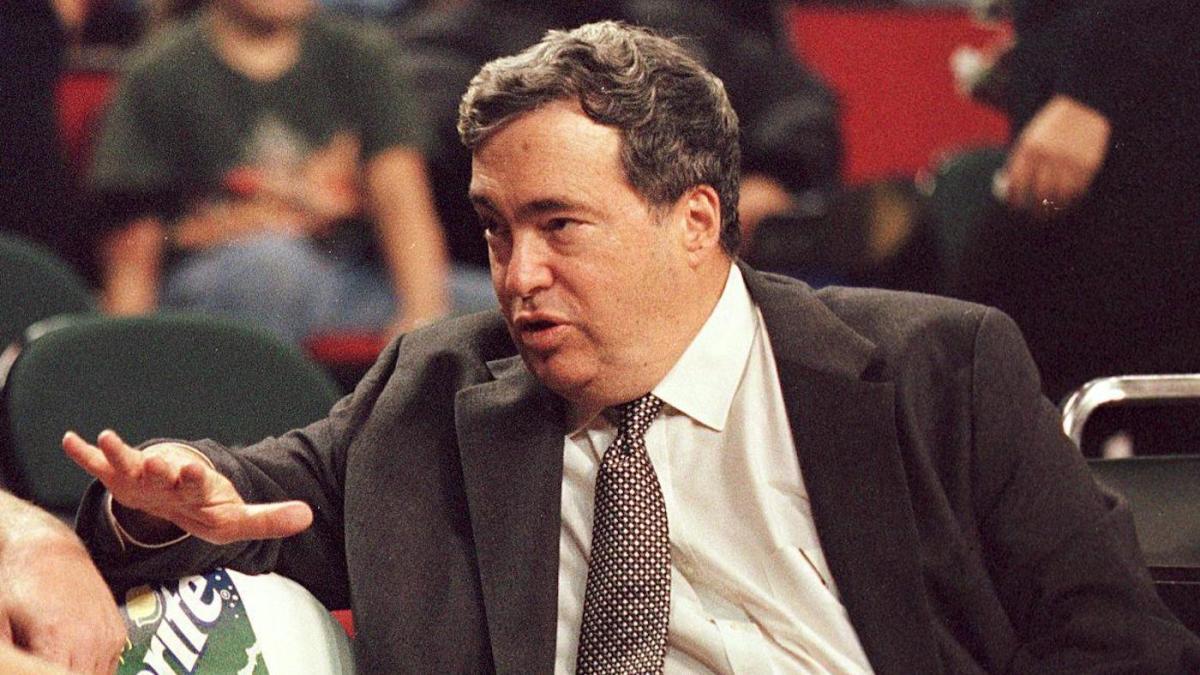In ‘The Last Dance’, the 10-part ESPN/Netflix documentary, the legendary Bulls executive takes yet another beating

Jerry Krause was never cuddly. He was not a friend to the media, nor to his competition. Much like Michael Jordan, he was obsessive about his job to the point where his colleagues couldn’t relate to him. The former Chicago Bulls general manager, who died in 2017 just before his long overdue Hall of Fame induction, earned the nickname “The Sleuth” because no scout was more secretive. Another one of his nicknames was “Crumbs,” which was derisively bestowed upon him by Charles Oakley but used so often by Jordan that everybody assumed Jordan had come up with it.
From a 1993 Sports Illustrated profile by Rick Telander:
Legend has it Jordan hung that nickname on Krause because, supposedly, there are always doughnut crumbs on Krause’s lapels. “That came from Charles Oakley,” corrects Jordan, referring to the former Chicago forward who is now with the Knicks. They pull tricks on him, crack on him. Not long ago Krause left his hat on the team bus. When he returned, he found it in the bathroom, in the bottom of the commode.
Jordan bullied Krause the way he played: Relentlessly, and with precision. He took aim at Krause’s weight, mooing like a cow when the executive dared to enter Chicago’s locker room. He told teammates embarrassing stories about Krause. He publicly criticized Krause and tried to get him fired. In “The Last Dance,” the 10-part ESPN/Netflix documentary, Jordan is still bullying him.
Behind-the-scenes footage reveals Jordan needling Krause by asking if he is taking diet pills. Jordan is also shown sarcastically asking Krause if he is going to join the Bulls’ layup line, then telling him they’d have to lower the rim. And that is just the first episode.
The more significant blow he landed though, is not the snide comments and mean nicknames. It is the way Jordan positions Krause as the villain in his story, just like he did more than 20 years ago. In the documentary, Krause comes off as slippery and cold, a stereotypically unloved oddball who simultaneously shunned the spotlight and resented that the players and the coach got all the attention.

Much of the criticism is fair. His fractured relationships with Jordan, Phil Jackson and Scottie Pippen made the 1997-98 season needlessly messy. Any honest portrayal of the end of the Bulls’ dynasty has to address Krause’s “way of alienating people,” as Bulls owner Jerry Reinsdorf put it in the documentary.
But it should also ask other questions. Did Krause shield Reinsdorf from scorn they should have shared? Yes. Is it fair that Jordan never forgave Krause for trying to make him sit out at the end of his second season so his foot injury could fully heal? No. Is Krause the only character whose ego and personal grudges prevented reconciliation? Absolutely not.
Krause is so much more than a punchline, and more than a good but socially awkward executive who couldn’t get out of his own way. He inherited a roster described in the doc as a “traveling cocaine circus” and described by Krause as “Michael and 11 other guys that I didn’t want.” Jordan’s six championships might seem inevitable now, but he didn’t win any of them before Krause traded his buddy and fired the coach that drew up a million plays for him. Replacing Oakley with Bill Cartwright and Doug Collins with Jackson were not initially popular moves with Jordan, but the superstar grew to understand they were necessary.
There is a long list of unconventional Krause moves that turned out to be brilliant. His trade for the pick that became Pippen in the 1987 draft remains one of the best in league history. In 1990, Krause drafted and stashed Toni Kukoc, a 6-foot-11 point forward from Croatia. The second three-peat was possible because of Kukoc, and because Krause took a chance on Dennis Rodman when Rodman’s career was falling apart and nabbed Steve Kerr and Ron Harper in free agency. That was a strikingly modern team, largely because Krause cared about versatility and length before everybody else did.
Krause’s flirtation with Tim Floyd while Jackson was trying to win titles was ridiculous. He rubbed agents, other general managers and people in his own organization the wrong way. You probably wouldn’t have liked him. But you might not have liked Jordan on a personal level, either, if you had to work with him. The difference is that “The Last Dance,” like most retrospectives about that era, presents Jordan’s intensity, stubbornness and abrasive leadership style as necessary components of his greatness. Krause’s paranoia and insecurity are rarely given the same soft-focus treatment.
News
Kyline Alcantara Drags Paolo Contis Into Breakup w/ Mavy?
Kapuso actress Kyline Alcantara is accused by veteran showbiz writer Lolit Solis of dragging actor-host Paolo Contis into her breakup issue with Mavy Legaspi. In 2023, the MavLine breakup was one of the celebrity breakups that caught the online community’s attention. Netizens…
Oh my god, this is crazy! Kobe Paras and Mavy Legaspi fight over Kyline Alcantara!
Rumors have been swirling lately about a potential love triangle between three popular figures in the Filipino entertainment industry: Mavy Legaspi, Kobe Paras, and Kyline Alcantara. While none of the involved parties have publicly addressed these speculations in detail, fans…
Kim Chiu and Barbie Forteza weighed in on the age-old debate of…
Kim Chiu and Barbie Forteza weighed in on the age-old debate of city life versus provincial life. In a recent YouTube vlog uploaded on March 31, 2024, the two Filipino actresses engaged in a candid conversation in a game of “This or That,”…
Barbie Forteza on the Dark Side of Friendship with David Licauco
Naniniwala si Barbie Forteza na marami sa mga manonood ang matatalino kung saan mas matimbang para sa kanila ang kalidad ng isang proyekto kesa personal na buhay ng mga bida. Isang perpektong halimbawa ay ang BarDa loveteam nina Barbie at David Licauco, na…
Sanya Lopez laughs off JakBie breakup rumors: “It’s funny…”
Pinagtatawanan lang ng Kapuso actress na si Sanya Lopez ang hindi mamatay-matay na isyung, diumano, hiwalay na ang nakatatanda niyang kapatid na si Jak Roberto at long-time girlfriend nitong si Barbie Forteza. Makailang beses nang naisyu ang relasyon nina Barbie at Jak o JakBie, lalo…
Barbie Forteza and David Licauco’s sweet memories in South Korea
Malaking bahagi ng pelikulang That Kind Of Love ay ginawa sa Seoul, South Korea, kaya tinanong ang mga lead stars ng pelikula na sina Barbie Forteza at David Licauco tungkol sa hindi nila makakalimutang eksena na kinunan sa naturang bansa. Photo/s: @pmproductionsinc on Instagram Umpisang lahad…
End of content
No more pages to load











